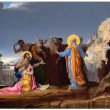Does Everything Happen for a Reason?
by Mark Shea
Filed under God's Nature

A reader once wrote to me to ask: "I have a quick question, and I apologize if it’s awfully trite, but I haven’t been able to find a satisfactory answer after (admittedly, not-so-exhaustive) searching. Here it is: From the standpoint of the Catholic Church: does everything happen for a reason? If it does, it smacks a bit of predestination; if it doesn’t, does that mean that God is out of control or doesn’t care? Say a flower grows on a mountaintop and it dies, and no human... Read More
Coming to our Senses: The Anagogical Sense of Scripture

NOTE: Over the past several months, we've had lots of combox discussion about how Catholics read and interpret the Bible. To help us all make sense of this question, we began a multi-part series on the topic. For the last several weeks, Mark Shea unpacked how Catholics authentically read the Bible. He began with a general introduction, then he outlined three specific guidelines. Next he launched into the three main spiritual senses (or lenses) through which Catholics interpret the Bible, focusing... Read More
Coming to Our Senses: The Moral Sense of Scripture

NOTE: Over the past several months, we've had lots of combox discussion about how Catholics read and interpret the Bible. To help us all make sense of this question, we began a multi-part series on the topic. Once a week, for the next several weeks, Mark Shea will unpack how Catholics authentically read the Bible. He began with a general introduction, then he outlined three specific guidelines. Last week he launched into the three main spiritual senses (or lenses) through which Catholics interpret... Read More
Coming to our Senses: The Allegorical Sense

NOTE: Over the past several months, we've had lots of combox discussion about how Catholics read and interpret the Bible. To help us all make sense of this question, we began a multi-part series on the topic. Once a week, for the next several weeks, Mark Shea will unpack how Catholics authentically read the Bible. He began with a general introduction, then he outlined three specific guidelines. Today he'll begin covering the three main spiritual senses (or lenses) through which Catholics interpret... Read More
Tools for Thinking Sensibly about Scripture

NOTE: Over the past several months, we've had lots of combox discussion about how Catholics read and interpret the Bible. To help us all make sense of this question, we began a multi-part series on the topic. Once a week, for the next several weeks, Mark Shea will unpack how Catholics authentically read the Bible. Last week he offered a general introduction, today he outlines three specific guidelines, and next week he'll begin covering the three main spiritual senses (or lenses) through which Catholic... Read More
How Catholics Understand the Bible

NOTE: Over the past several months, we've had lots of combox discussion about how Catholics read and interpret the Bible. To help us all make sense of this question, we're beginning a multi-part series on the topic. Once a week, for the next several weeks, Mark Shea will unpack how Catholics authentically read the Bible. Today he offers a general introduction, next week he'll outline three specific guidelines, and the following week he'll begin covering the three main spiritual senses (or lenses)... Read More
Being, Miracles, and God: Answering a Reasonable Atheist
by Mark Shea
Filed under The Existence of God

In the course of a discussion on my personal blog about the existence of God and of the miraculous, an unbelieving reader (who strikes me as open to reasonable discussion) wrote me to say: "All I’m saying is that people everywhere demonstrate a powerful desire to believe that there is intervention in the material universe from outside the material universe." Except that’s not true. Lots of people also demonstrate a powerful desire to believe there is no intervention in the material universe. ... Read More
Should the Bible Be Taught in Public Schools?

Recently, there has been a bit of discussion about the possibility of teaching “Introduction to the Bible” courses to a generation of students illiterate about the most foundational document in Western Civilization. Not surprisingly, discussion has tended to polarize into two groups: those who insist on the “wall of separation” between Church and State, and those who insist on getting “back to the Bible” if we hope to save what little remains of civilization in a schoolyard dominated... Read More
Is There Such a Thing as Moral Progress?

One of the questions that comes up from time to time in the blogosphere is the problem of moral progress. It happens in a number of ways. For instance, a favorite trope of the atheist fundamentalist is the “Ha! You call Thomas More a saint? He burnt heretics at the stake!” shout of triumph. (Of course, atheist fundamentalists don’t like to think too hard about the achievements of Stalin or Mao or Pol Pot, and seem uncommonly hurried in their attempts to identify their atheist regimes as specimens... Read More







